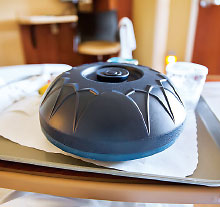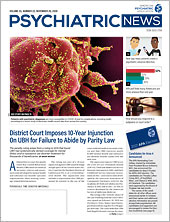Children With ASD, ADHD Receive More Health Services as Infants
Children later diagnosed with autism spectrum disorder (ASD) and/or attention-deficit/hyperactivity disorder (ADHD) receive more health services before age 1 than those who do not receive a diagnosis of either condition, according to a study in Scientific Reports. The findings suggest that information obtained from the health records of babies in their first year may help identify children at risk of ASD or ADHD.
Investigators at Duke University School of Medicine used electronic health record data from the Duke University Health System to assess the outcomes of all children born between 2006 and 2016 who attended at least two well-child visits by the age of 1. The sample included 29,929 children, of whom 1.6% and 4.4% were eventually diagnosed with ASD or ADHD, respectively.
The investigators found differences in health care use among children with either disorder from the outset. Children with ASD or ADHD spent a longer time in the hospital after birth relative to children without these conditions (average of 6.5 hours longer for ASD and 3.8 hours longer for ADHD compared with the no diagnosis group).
Children with ASD or ADHD were also more likely to receive additional procedures before their first birthday. Children later diagnosed with ASD were about 2.4 times as likely to require intubation and ventilation, 3.0 times as likely to need physical therapy, and 3.5 times as likely to have an ophthalmology exam relative to children with no diagnosis. Children later diagnosed with ADHD were 4.7 times as likely to need a blood transfusion and 1.6 times as likely to visit an emergency department (ED).
“[T]he two disorders are associated with distinct patterns of early health interactions that could be monitored through the [electronic health record] to stratify patients’ risk of developing ASD and ADHD,” the researchers wrote.
Higher-Calorie Refeeding Can Speed Recovery from Anorexia
The standard of care for treating patients hospitalized for anorexia nervosa is to cautiously reintroduce calories over time to limit the risk of refeeding syndrome, an electrolyte imbalance that can induce delirium and even death. A clinical trial published in JAMA Pediatrics now suggests a higher-calorie refeeding regimen can help patients with anorexia stabilize faster than a lower-calorie refeeding regimen.
Researchers at Stanford University and colleagues enrolled 120 adolescents and young adults with anorexia nervosa or atypical anorexia nervosa hospitalized for malnourishment for this study. The participants received either a lower-calorie diet (refeeding started at 1,400 calories/day and increased by 200 calories every other day) or a higher-calorie diet (refeeding started at 2,000 calories/day and increased by 200 calories every other day).
The patients who received the higher-calorie refeeding stabilized faster in the hospital (including restored blood pressure, heart rate, and body temperature) compared with those receiving lower-calorie refeeding: 7 days versus 10 days. Those in the higher-calorie group also had shorter lengths of stay at the hospital compared with those in the lower-calorie group: discharged in an average of 8 days relative to 12 days. There were no differences in the number of patients who experienced disturbances in key electrolytes (magnesium, potassium, or phosphorus) or who required electrolyte supplements between the groups.
The researchers noted that this trial will extend with a long-term phase to see if these two feeding approaches lead to any difference in clinical remission of anorexia.
Language Problems Worse with Some Antipsychotics
Language disturbances are common in patients with schizophrenia. A study appearing in NPJ Schizophrenia suggests that antipsychotic medications that strongly attach to the dopamine D2 receptor (D2R) may worsen some of these problems.
Researchers at University Medical Center Groningen in the Netherlands and colleagues used language processing software to assess the speech of 41 patients with schizophrenia and 40 controls without schizophrenia. Twenty-three of the schizophrenia patients were taking strong D2R drugs, such as haloperidol or risperidone; 18 were taking weaker D2R drugs, such as clozapine or quetiapine. The researchers interviewed all participants, using the same set of neutral questions (for example, Have you been to an amusement park? and Do you have a driver’s license?).
Both groups of patients with schizophrenia spent less time speaking during the interview and used fewer clauses per response compared with the controls. Patients taking strong D2R drugs displayed additional deficits compared with controls, including increased pausing between words and taking longer to articulate words.
The researchers also uncovered some significant differences between the two patient groups: Patients taking strong D2R drugs said fewer total words during the interview and were more likely to repeat words over time than patients taking weaker D2R drugs.
The researchers noted that the lack of any medication-naïve patients with psychosis or patients taking an antipsychotic for another illness such as bipolar disorder precluded any definitive assessment of antipsychotics’ language effects. However, “as language is a highly important source of information in the psychiatric evaluative process, clinicians should be aware that poverty of speech in patients might be at least partly an effect of [highly dopaminergic] medication,” they wrote. ■



